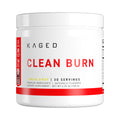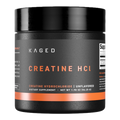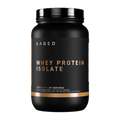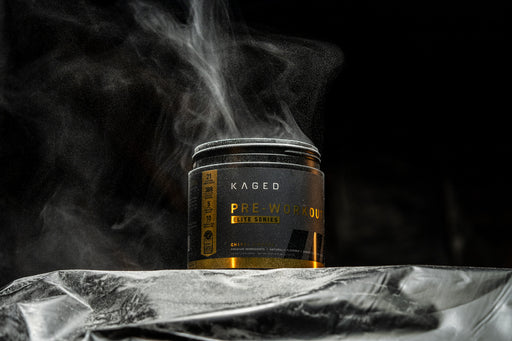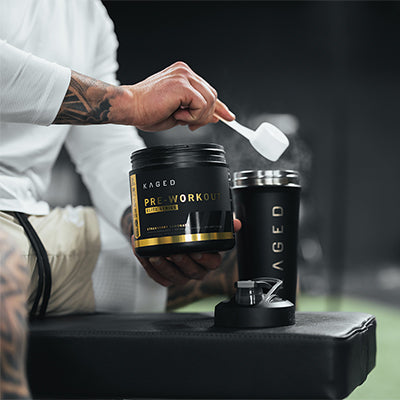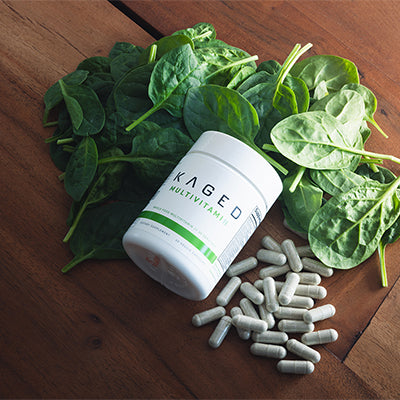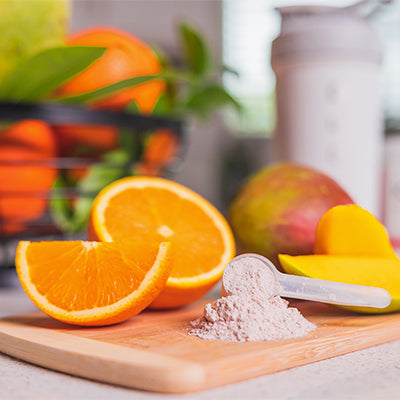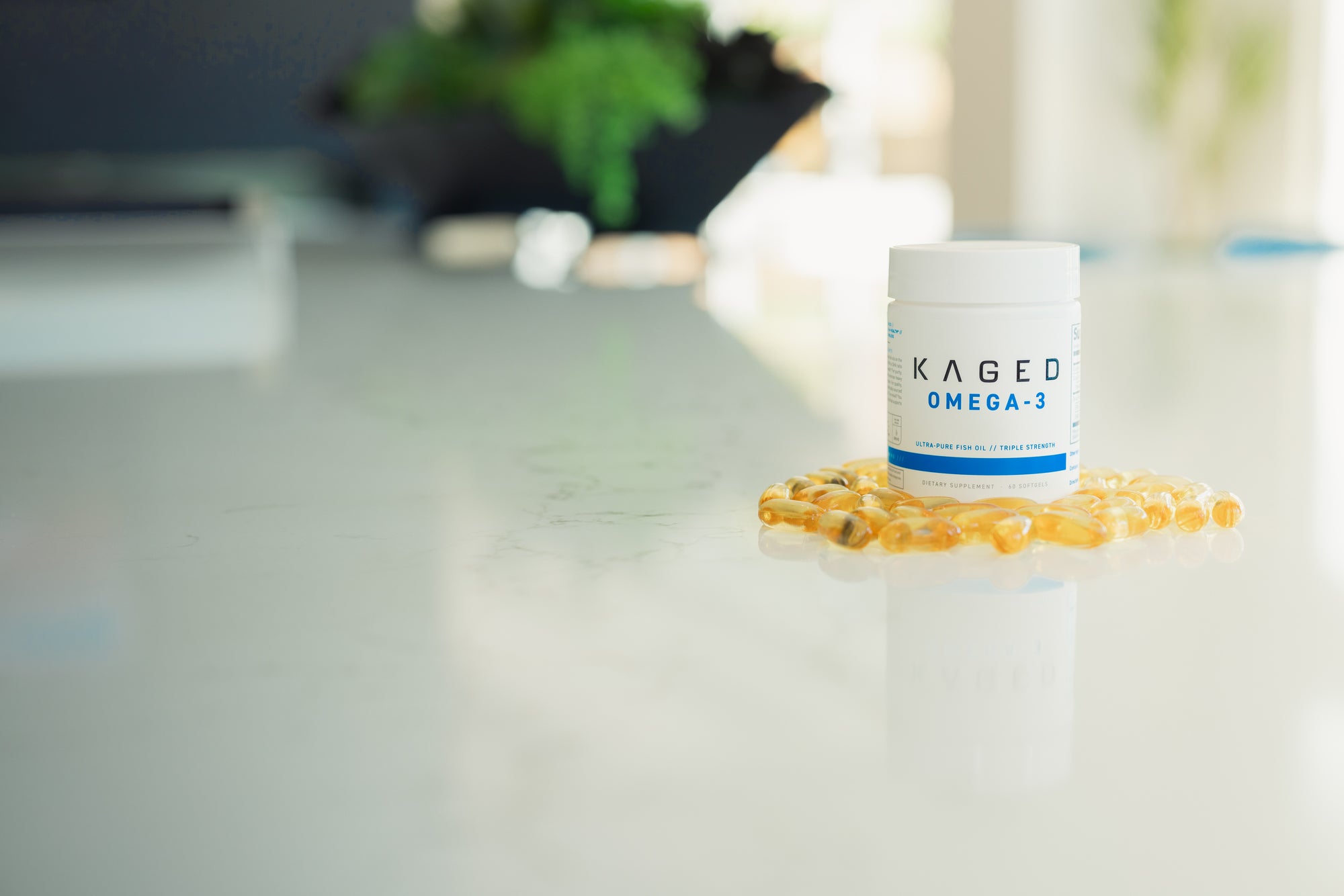While supplement labels may make them seem synonymous, omega 3s and fish oil are not the same thing.
By making it appear that way, supplement companies can make it appear at first glance that their products have more omega-3 fatty acids than they actually do.
Omega 3s and Fish Oil Are NOT The Same Thing
In a sentence, fish oil contains omega-3 fatty acids, but not all fish oil is omega-3.
Look at the back of the bottle!
Let’s use the Kaged Omega 3 label as an example. Kaged Omega 3 stands out for several reasons, which we cover in this article, The Ugly Truth About Many Fish Oil Supplements. One of those reasons is because it has a high ratio of fish oil to omega-3 fatty acids.

As you can see, every 2-capsule serving contains 3000mg of total fish oil.
This includes 2000mg total of omega-3 fatty acids. 1100mg of this is EPA and 900mg is DHA.
When You’re Choosing a Fish Oil Supplement, It’s The Omega-3 Content That Matters
Now, no fish oil supplement will have 100% omega-3s. That’s because the oil extracted from fish will contain an array of fatty acids. However, it’s the omega-3s that have been shown to support heart, brain, and joint health, so you want to look for a higher dose of omega-3s.*
For example, a typical “supermarket” fish oil contains 2000mg of fish oil per 2-capsule serving and only about 600mg of omega-3 fatty acids. The 600mg is the number to focus on.
At Kaged, we choose a super high-quality form of fish oil that contains a higher ratio of omega-3s. In the same 2-capsule serving, you’ll get 3x the omega-3 dose of many fish oil supplements.

SHOP KAGED OMEGA-3
Are DHA and EPA Omega-3s?
Yes! DHA and EPA are acronyms for Eicosapentaenoic Acid and Docosahexaenoic Acid, two very well-researched and naturally occurring omega-3s found in fish.
Alpha-linolenic acid (ALA) is the third most common omega-3, but it’s not found in fish. It’s abundant in flaxseeds and walnuts.
All omega-3 fatty acids are classified as polyunsaturated fatty acids because they contain more than one double bond in their chemical structure. This means their carbon chains have multiple double bonds, specifically at the third carbon from the end of the chain (hence the name "omega-3").
These double bonds introduce kinks in the fatty acid chains, preventing them from packing tightly together, which keeps them liquid at room temperature and contributes to their beneficial effects on health.
Why Choose an Omega-3 Supplement?
Omega-3s are some of the world’s healthiest fats. They have been shown to support brain, heart, and joint health.*
Further, in today’s modern society, many of us don’t get enough. That’s because the staples of modern diets lack omega-3s, and instead contain an abundance of omega-6 fatty acids.
Omega-3 and omega-6 fatty acids are both essential fats, meaning your body cannot produce them on its own and must obtain them from your diet. However, the balance between these two types of fatty acids is crucial for maintaining optimal health.
Omega-6 fatty acids are found in many processed foods, vegetable oils, and grains, which are prevalent in modern diets. While omega-6s are also necessary for health, they can promote inflammation when consumed in excess, particularly without a corresponding intake of omega-3s.
Historically, human diets had roughly equal amounts of omega-3 and omega-6 fatty acids. However, the typical modern diet now has a much higher ratio of omega-6 to omega-3. This imbalance is problematic because while omega-6s can support inflammatory processes (which are necessary for immune function and healing), omega-3s are anti-inflammatory and help to balance this effect.
Can You Get Omega-3s Without Fish Oil?
Omega-3s are “essential” fats, meaning you have to get them from diet or supplementation. With that said, you can get them in food.
Here are some of the best dietary sources of omega-3 fatty acids, besides fish:
Flaxseeds and Flaxseed Oil: Flaxseeds are one of the richest sources of ALA (alpha-linolenic acid), a type of omega-3 fatty acid. Ground flaxseeds are also a great option to add to smoothies, oatmeal, or baked goods.
Chia Seeds: These tiny seeds are another excellent source of ALA, providing about 5,060 mg of ALA per ounce (about two tablespoons). They can be easily added to yogurt, salads, or used to make chia pudding.
Walnuts: A handful of walnuts (about one ounce) are a true superfood. They make a great snack or addition to salads and baked goods, or just as a standalone snack.
Eggs: Some eggs, particularly those labeled as enriched with omega-3s, can provide a good source of DHA and EPA. Local, fresh eggs may have higher omega-3 content, depending on what the chickens eat!
Some Fish Oil Supplements Are Hiding a Lot…
Have you ever wondered how they can just sit on the shelf at room temperature on shelves? Have you have questioned whether the “fishy burps” or “fishy aftertaste” were a symptom of a deeper problem?
We sat out to make one of the highest-quality fish oils on the market to address these problems. You can learn more in this article, The Ugly Truth About Many Fish Oil Supplements.
*These statements have not been evaluated by the Food and Drug Administration. This product is not intended to diagnose, treat, cure, or prevent any disease.

